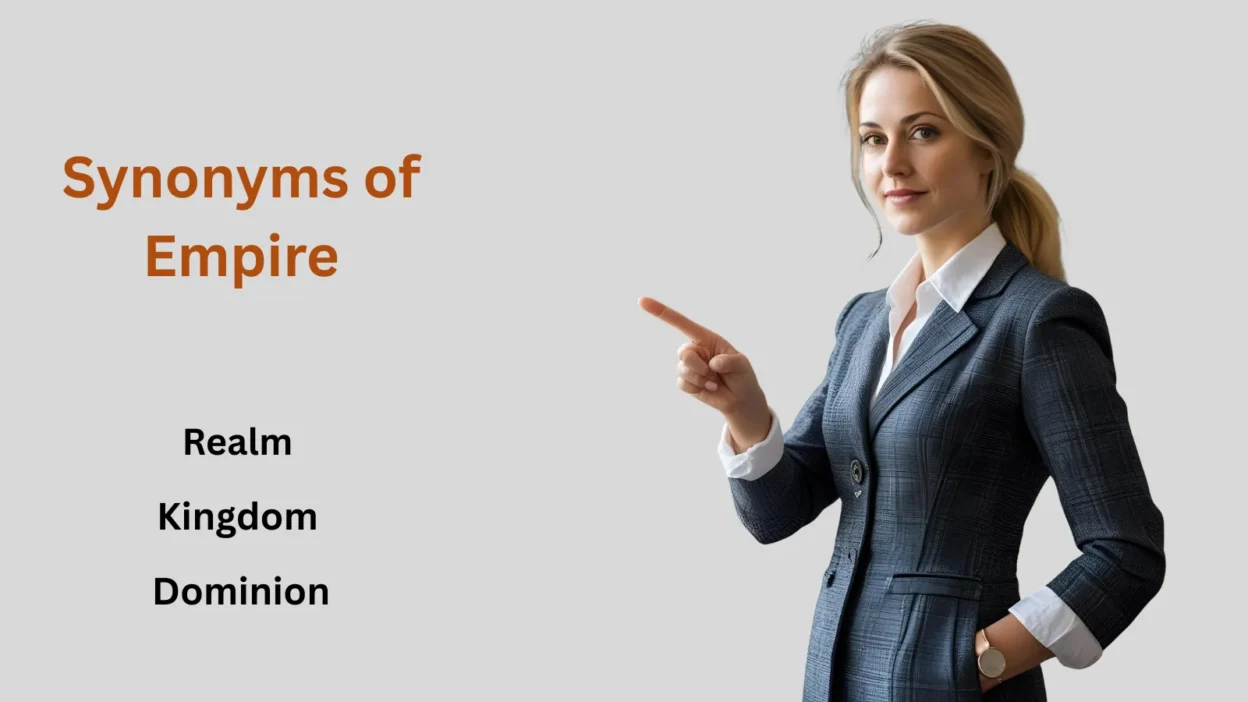The word empire instantly brings to mind power, vast lands, and influence over people. It suggests control, order, and authority on a grand scale. But sometimes, you may want to describe an empire in a fresh and creative way. That’s when synonyms of empire become useful.
Writers, students, and curious readers often look for alternatives that capture the same sense of prestige, ambition, and dominance. Each synonym offers its own shade of meaning—some highlight strength, others emphasize influence, and a few carry the weight of ambition or control.
If you’re crafting a story, preparing a speech, or imagining a new world, the right synonym can make your words sharper, more vivid, and full of impact.
In this article, we’ll explore 30 powerful synonyms of empire. You’ll see clear definitions, real examples, and tips on when to use each word so you can choose the perfect one for your writing.
What Does Empire Really Mean?
At its core, an empire is:
- A large political unit, often consisting of multiple nations or territories under one sovereign authority.
- Symbolic of power, authority, and reach—both geographically and culturally.
- Sometimes associated with expansionism and control, but also with structure and legacy.
Empire suggests not just size, but organized dominance. It’s grand, sometimes intimidating, and carries a sense of history.
30 Synonyms of Empire and When to Use Them
1. Kingdom
- Meaning: A country ruled by a king or queen; often smaller and more contained than an empire.
- Example: The medieval kingdom thrived under Queen Isabella’s rule.
- When to use: For monarchies that focus on a single nation or culture, usually less vast than empires.
2. Dominion
- Meaning: Control or the territory governed by a ruler.
- Example: Canada was once a dominion of the British Crown.
- When to use: Formal or legal contexts, especially referring to territories under sovereign control without full independence.
3. Realm
- Meaning: A kingdom or domain, often used poetically or in fantasy contexts.
- Example: The fairy tale spoke of a mystical realm beyond the mountains.
- When to use: To evoke a more imaginative or historical sense of territory.
4. Commonwealth
- Meaning: A political community founded for the common good.
- Example: Australia is a member of the Commonwealth of Nations.
- When to use: When referring to a group of states with shared governance or cooperation, often with democratic or voluntary undertones.
5. Sovereignty
- Meaning: Supreme authority or power over a territory.
- Example: The sovereignty of the island nation was recognized by the UN.
- When to use: To emphasize political independence or authority rather than size.
6. Dynasty
- Meaning: A sequence of rulers from the same family.
- Example: The Ming dynasty ruled China for centuries.
- When to use: When focusing on the ruling family or lineage behind an empire.
7. Territory
- Meaning: Land under control but possibly less politically structured than an empire.
- Example: The explorers claimed the new territory for their homeland.
- When to use: For areas controlled or claimed but without strong governmental structure.
8. Province
- Meaning: A part of a country or empire, governed as a unit.
- Example: Quebec is a province of Canada.
- When to use: To describe subdivisions within an empire or kingdom.
9. Colony
- Meaning: A territory settled and controlled by a distant country.
- Example: The British established many colonies in North America.
- When to use: Historical or political contexts involving overseas expansion and control.
10. Confederation
- Meaning: A union of states or groups united for a common purpose.
- Example: The Confederate States of America formed during the Civil War.
- When to use: When emphasizing cooperation among semi-independent states.
11. Federation
- Meaning: A political entity characterized by a union of partially self-governing states.
- Example: The United States is a federation of 50 states.
- When to use: To highlight political unity with individual autonomy.
12. Hegemony
- Meaning: Dominance of one group or state over others.
- Example: The empire’s hegemony extended across the continent.
- When to use: To emphasize dominance and influence, often with political or cultural connotations.
13. Empire-State
- Meaning: A state that governs an empire.
- Example: Ancient Rome was a powerful empire-state.
- When to use: In historical or political analysis focusing on the governing entity.
14. Regime
- Meaning: A government, especially an authoritarian one.
- Example: The regime imposed strict controls on its citizens.
- When to use: To stress the government’s style, often negatively or critically.
Want a message that creates a smile? Tap to explore Wishaniversary.com—full of sweet, romantic anniversary lines.
15. Empire-Building
- Meaning: The act or process of expanding power and influence.
- Example: The king was focused on empire-building through conquests.
- When to use: Describing ambition and expansion rather than the empire itself.
16. Territorial State
- Meaning: A state whose power is based on control over a defined territory.
- Example: The territorial state expanded through warfare.
- When to use: For historical or political science discussions on state formation.
17. Kingdom of Heaven
- Meaning: Spiritual or religious empire.
- Example: The preacher spoke of the Kingdom of Heaven.
- When to use: Religious or metaphorical contexts.
18. Dominion State
- Meaning: Semi-autonomous territory within an empire.
- Example: New Zealand was a dominion state under British rule.
- When to use: When discussing political status within an empire.
19. Sphere of Influence
- Meaning: Area influenced or controlled politically or culturally.
- Example: The Cold War saw competing spheres of influence.
- When to use: Geopolitical contexts emphasizing indirect control.
20. Imperium
- Meaning: Latin for absolute power or command.
- Example: The Roman imperium was absolute under Julius Caesar.
- When to use: Formal or classical contexts emphasizing supreme authority.
21. Empire of the Mind
- Meaning: Metaphorical empire, referring to intellectual or cultural dominance.
- Example: The writer built an empire of the mind with his works.
- When to use: Metaphorical or literary contexts.
22. Nation
- Meaning: A large group of people united by culture, history, or language.
- Example: The nation declared independence from its colonizers.
- When to use: For politically or culturally unified peoples, often smaller than empires.
23. Dominance
- Meaning: Power and influence over others.
- Example: Their economic dominance shaped global markets.
- When to use: When highlighting power dynamics without territorial specifics.
24. Imperial State
- Meaning: A state ruled by an emperor.
- Example: The Imperial State of Japan had a long history.
- When to use: Formal historical or political usage.
25. Empire of Commerce
- Meaning: A vast business or economic network.
- Example: The company built an empire of commerce spanning continents.
- When to use: Business or economic contexts.
26. Empire of Culture
- Meaning: Influence through art, language, and customs.
- Example: The French empire of culture spread through fashion and cuisine.
- When to use: Cultural influence contexts.
27. Imperium Romanum
- Meaning: The Roman Empire, a Latin phrase.
- Example: The Imperium Romanum lasted centuries.
- When to use: Classical or historical references.
28. Dominion of the Seas
- Meaning: Naval supremacy.
- Example: Britain claimed dominion of the seas in the 19th century.
- When to use: Maritime power contexts.
29. Empire of Ideas
- Meaning: Intellectual or ideological influence.
- Example: The philosopher’s teachings created an empire of ideas.
- When to use: Intellectual or ideological contexts.
30. Empire of Light
- Meaning: Metaphor for enlightenment or knowledge.
- Example: The Renaissance was an empire of light.
- When to use: Poetic or metaphorical references to knowledge and progress.
How to Choose the Right Synonym
- Context is king: Use kingdom or realm for smaller, more traditional territories. Opt for empire or hegemony when emphasizing vast power and dominance.
- Tone matters: Regime can sound negative or oppressive, while commonwealth sounds cooperative and positive.
- Historical vs. modern: Imperium and Imperium Romanum work well for classical or historical references, whereas federation suits modern political unions.
- Cultural nuances: Use empire of culture or empire of ideas to express influence beyond mere geography.
- Metaphorical uses: Terms like empire of the mind or empire of light fit well in poetic or intellectual writing.
Conclusion
Exploring the many synonyms of empire reveals just how rich and flexible English can be. An empire is more than land or power—it is a symbol of influence, ambition, and authority.
Words like realm, kingdom, dominion, dynasty, and federation each bring their own meaning and feeling. Some emphasize strength, others prestige, and a few hint at ambition or control. Choosing the right word can transform your writing, making it clearer, stronger, and more vivid.
Understanding the subtle differences between words allows you to match your language to your message. From describing historical empires to imagining fictional worlds, the right synonym can make your writing more engaging, dynamic, and memorable.



